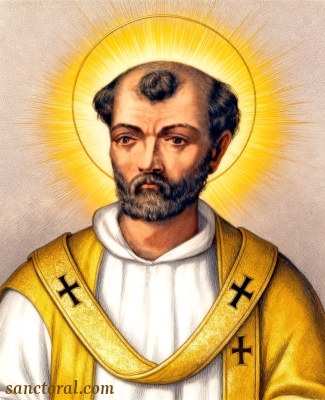Lives of the Saints
Our Models and Protectors
Spiritual Bouquet:
September 23

Saint Linus
Pope and martyr
(† 67)
Saint Linus was converted in Rome in the days when Saint Peter was preaching the Gospel there. This nobleman, originally from the city of Volterra in Tuscany, left his father and renounced his heritage, to practice with greater perfection the doctrine of Our Lord Jesus Christ. He soon gave admirable proofs of his zeal, learning and prudence, and the first Vicar of Christ employed him in preaching and the administration of the Sacraments.
He crossed into Gaul, and became the bishop of the city of Besançon. The number of the faithful increased daily by the conversion of many idolaters. The Saint one day attempted to turn some of those away from the celebration of a festival in honor of their gods, telling them that these idols were but statues without breath or sentiment, and represented only human beings whose vices were public knowledge. He exhorted them to turn to the unique God, Creator of the heavens and the earth, to whom alone man owes the homage of sacrifice. A prodigy followed his words; a column of their temple crumbled and caused the fall of an idol, which broke into a thousand pieces. The worshipers, unmoved by this, drove the Saint out of the city of Besançon, as the city's tradition still attests.
He returned to Rome and was there when the prince of the Apostles was martyred. He wrote an account of the double martyrdom of Saints Peter and Paul, and was himself judged worthy to replace the first Vicar of Christ. The register of his reign records the creation of fifteen bishops and eighteen priests. The Roman breviary says that the faith and sanctity of this blessed Pope were so great that he drove the demons from many possessed persons. He had governed the Church for scarcely a year before he, too, shed his blood for his Saviour. His body was buried in the Vatican near that of Saint Peter. It was only in the 17th century that his tomb reappeared, marked Linus, when Pope Urban VIII had the work on the Confession of Saint Peter completed in the Basilica bearing his name.
Les Petits Bollandistes: Vies des Saints, by Msgr. Paul Guérin (Bloud et Barral: Paris, 1882), Vol. 11